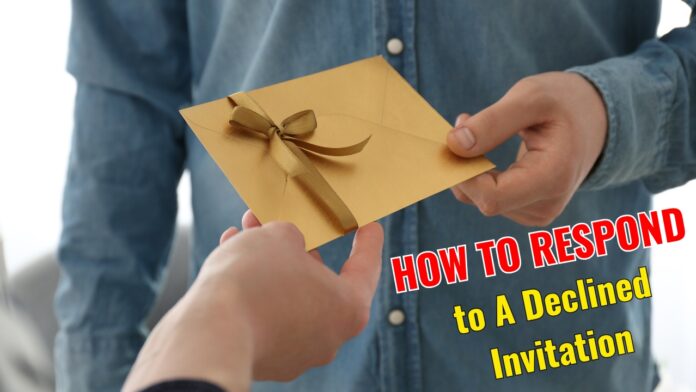Although an invitation might be declined, it is most discouraging, but also the best way to improve your relationship as well as improve your impression before your potential match. When you gather with friends or colleagues, two things alone are mature and understanding: to craft the proper reply.
For this reason, in this guide, we will discuss all the ways of how one can decline an invitation without being rude and will help you realize how to do it in a polite, casual, formal, or funny way.
Why Your Response Matters
An invite rejection may lead the person to feel either guilty or worried that they hurt you. A thoughtful reply can:
- Maintain a positive connection
- Show empathy and understanding
- Keep the door open for future invitations
- Avoid awkwardness or resentment
Now, let’s dive into the best ways to craft your response.
Polite & Understanding Responses
A respectful reply preserves the pleasant nature of a conversation with that person. Several polite approaches exist to handle declined invitations according to the following examples:
- “No worries at all! I appreciate you getting back to me—let’s plan something another time.”
- “Thanks for letting me know! I completely understand, and hopefully, we can catch up soon.”
- “Thanks for your honesty! We’ll miss you, but there’s always next time.”
- “I totally get it. Life gets busy! Let’s reconnect when things settle down.”
- “I appreciate you taking the time to respond. Maybe another time will work better!”
The responses function effectively both in business settings and social situations to minimize hurt feelings.
Casual & Friendly Responses
People use relaxed communication styles to preserve the relaxed environment during events like birthday parties and casual settings. Try these:
- “No problem! More snacks for me, haha. Let’s meet up soon!”
- “Bummer, but I get it! Hit me up when you’re free for coffee.”
- “All good! We’ll just have to double the fun next time.”
- “Aw, we’ll miss you! Let’s plan a rain check soon.”
- “No stress! Maybe next time the stars will align.”
Using relaxed language creates a situation in which the other person faces no required action.
Formal & Professional Responses
For business events, meetings, or formal gatherings, a polished response maintains professionalism. Consider these:
- “Thank you for your response. I understand your schedule is busy, and I appreciate you letting me know. Perhaps we can arrange another time.”
- “I appreciate your prompt reply. While we’ll miss your presence, I hope we can connect in the future.”
- “Thank you for informing me. I completely respect your commitments and hope we can collaborate another time.”
- “Understood! I appreciate your transparency. Let’s stay in touch for future opportunities.”
- “Thank you for your consideration. Wishing you all the best, and I hope we can meet soon.”
These responses keep the tone respectful and leave room for future engagements.
Humorous & Lighthearted Responses
A special bond you have developed enables you to reply in a way that reduces tension resulting from rejection. The following lines make up effective responses to rejection invitations:
- “Guess I’ll have to party twice as hard to make up for your absence!”
- “Well, now I’ll have to eat your share of the cake. What a tragedy… for my diet.”
- “You’re missing out on my legendary dance moves, but I’ll save them for next time!”
- “No worries! I’ll just tell everyone you were too cool to show up.”
- “I’ll try not to have too much fun without you… No promises though!”
Humor can soften the decline and keep the mood upbeat.
When to Suggest an Alternative Plan
You can extend an alternate meeting time in a friendly way while ensuring your requests do not appear demanding.
- “No problem! Would next weekend work better for you?”
- “Maybe another time suits you better? I’d love to catch up!”
- “Understand! Let me know when you’re free for a quick coffee.”
The communication stays accessible while avoiding the imposition of any pressure.
What NOT to Say When Someone Declines
Strengthening healthy communication requires a person to steer clear of both passive-aggressive expressions and guilt-inducing statements.
- ❌ “Wow, I guess you’re too busy for me now.”
- ❌ “Fine, I’ll just go alone then.”
- ❌ “Everyone else is coming, but okay…”
Staying positive defines the best approach since negative reactions create relationship stress.
Final Thoughts: Handling Declined Invitations with Grace
His responsibility to display emotional intelligence requires him to respond well regardless of what social event he wants to introduce to others. The key takeaways:
- ✔ Acknowledge their response with kindness
- ✔ Keep the tone positive and understanding
- ✔ Use humor if appropriate
- ✔ Avoid pressuring them for reasons
- ✔ Leave the door open for plans
Acquiring such response techniques enables you to maintain strong interpersonal connections when people alter their social plans.
Conclusion
The response needs to be short but genuine since an awkward delay would serve no purpose. The way you respond should be both short and friendly to prevent harming relationships.
You now have the ability and elegance to handle all situations involving rejection.
